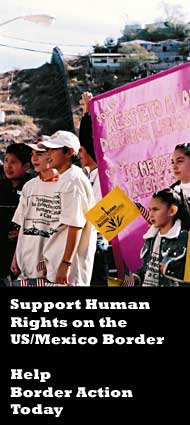This is the second in a two-part reflection on the "border crisis." First, from the introduction to Part I:
A lack of solid information has never stopped an American from forming an unshakeable conviction, and so it is on the question, what to do about the border with Mexico.
I don’t know how the "border crisis" will end or even whether it will end. I do know that NAFTA and CAFTA are making it worse for Mexico and Central America and for us. I do know that keeping our focus exclusively on illegal immigration keeps our attention off the far greater threat of privatization, disaster capitalism, and the flagrant disinvestment of major US corporations in the future of America.
I also know that cries for a border wall and protestations of national sovereignty are too often made by people who've never been southwest of Cincinnati--often the same people who support invading Iraq and taking its oil because our need makes us entitled to it.
For me, attacking people who have the guts to walk across this killer desert to pursue hopes their leaders and ours have made unrealizable at home, is just wrong. Even the rhetoric we use distances us from our capacity for empathy and thus from the conviction to pursue a truly just and lasting solution. These aren’t “illegals.” They, like us, are dreams incarnate. For more, see Part I, previously posted, and continue here with Part II.
Part II
If you’ve seen Babel, you have only a slight idea of the hazards of this desert. Adriana Barraza’s breathtaking performance as Amelia, the nanny, takes us into the risks only as far as the dangers of less than a day’s relentless sun and disorienting dehydration.
The fact is that for many, the journey from the border to a life and a job somewhere in America takes many days through rugged terrain shared with rattlers, scorpions, spiders. And that’s not counting the journey to get tothe border.
There are also cactus of many kinds, whose every barb is may be covered in bacteria that rachet up the pain. This land is unforgiving even in cool weather. In summer, the heat is simply incomprehensible. You can read figures like 106° or 110° and 116°, but unless you’ve experienced this heat without shade, and felt it reflected back again from desert rock, you have no idea.
The media spotlight small bands of young men, mostly, but increasingly, the volunteers at Humane Borders see young single women, teens, and younger adolescents traveling alone, without a single adult male guardian. They tell us that least 75% of these women have been raped at least once on their journey north.
These little bands, some with babies, cannot be prepared. Water weighs too much, and other things have to be brought along, or else are wanted.
It’s clear where they’ve passed. They leave signatures, trails of discarded backpacks, broken sandals and shoes, empty water jugs, “personal items such as photos, Bibles, love letters, tooth brushes, soccer cards, wallets” [Emily Dechamps, Humane Borders medical volunteer, in Desert Fountain, August 9, 2007.], the occasional cell phone. Incredibly, sometimes they leave “strollers and bicycles, artifacts of efforts to ease the journey by people who’ve been lied to about what they’re in for. We know from interviews that the coyotes often promise just an easy day’s walk, and discourage the people from carrying more than a gallon of water or two at most.” [The Rev. Liana Rowe, Humane Borders volunteer coordinator for Phoenix, AZ. Personal communication.]
Soiled diapers, tampons, toilet paper, and human feces lie where they fell. So do severely injured people with bloody, blistered, and sometimes broken feet, flesh torn by cactus and scrub, eyes glazed in the last stages of dehydration. So do bodies. From the vantage of the border towns, these aren’t fit challenges for neighborhoods.
Sometimes the immigrants come by car or truck, and often there are fatal accidents:
This time, he is twenty-two. . . . Jose's body is incredibly swollen-- you have to pry his eyes open to check his pupils. His body is in severe shock. His intracranial pressure is too high--so high, his low blood pressure can't overcome it to get oxygen rich blood to his brain. There are many signs now that his brain is no longer working. [Emily Dechamps, Humane Borders medical volunteer, Desert Fountain, August 9, 2007]
What makes a person take on this journey? Two things: Hope and desperation. Such incentives won’t be countered with checkpoints, guns, and fences or by unrelenting sun, and snakes and cactus spines.
If it were up to me, I’d welcome those who want to be here so badly, for this is the human spirit we’re talking about, with faith, guts, stamina, and vision to match its aspirations and needs. Isn't this what we want in our gene pool? These qualities don’t just bloom north of the border. They’re universal. What you see running, walking, or lying dead or half-dead in the desert isn’t “an illegal.” That’s a person. That’s a dream incarnate.
Details emerge, gathered from fellow travelers and emergency reports. There were eleven people in the van. They were newly arrived in our country, and all here illegally. He has four children back in Mexico. He was coming to fund dreams, dreams like school that require uniforms and books. We have no idea how to find and contact his family. He is going to die soon. The search begins in earnest when organ donation services come for a screening. Finally, some progress is made. Our phone starts to ring, people asking questions in Spanish. Where do we start?
They won't be able to come see him. They live too far away. Buses don't travel fast enough, and they cannot buy plane tickets. We will ship his body back to Mexico. The sadness along our border grows and grows, and some days I can actually feel the divide between us growing wider too. [Emily Dechamps, Desert Fountain, August 9, 2007]
All of us can empathize. After all, we’re a nation of immigrants, a nation of pioneer settlers who once made similar journeys, once transgressed other people’s boundaries pursuing dreams. The difference between these men and women and the pioneer heroes we love to celebrate is language and net worth. One difference between then and now is that now it’s what we call our turf that’s being transgressed. We’re afraid they might be “getting over,” getting something for free. The other difference is that then, our culture emphasized the “can-do” spirit, the viability of “the American Dream.” Today, it emphasizes alien threats and terrorists, and we are so easily frightened. From a country that formerly invited foreigners here to work and afraid of nothing, we’ve become a country afraid of everything.
And yet. If I lived in Douglas or Tubac or Green Valley or somewhere in Patagonia pursuing my dream--a ranch, a double-wide, retirement, whatever--I would be angry, too. I wouldn’t have asked to be afraid of being robbed and beaten by coyotes and drug smugglers in my own home. For my yard to be a public toilet. For streams of immigrants whispering past my house all hours of the night the whole year long. I wouldn’t have asked to be afraid to hike in my mountains, or picnic in canyons where hummingbirds flock, for fear of armed smugglers. I would be furious “at finding my cattle dead from ingesting plastic bags” [The Rev. Liana Rowe, personal communication] and fed up with fixing fences and water lines and trying to protect my family from that filth. I would be sick of being afraid and angry. I would think, “My government should protect me. It just should.” My stock of compassion would run dry pretty damn quick. I might even welcome the Minutemen to take shots at “illegals” on my land.
This isn’t easy to get your mind around, much less to resolve. And I haven't even talked about the drug-smuggling.
I don’t know how it will or can end, but I do know that NAFTA and CAFTA aren’t helping. Besides killing off small Mexican farms that once provided a good living for people growing and exporting fruit or vegetables,
such trade polices have destroyed Mexico’s previously healthy 5-6% annual GDP. Besides not supporting a vigorous border-side factory economy, NAFTA and CAFTA have dealt a double blow.
After all, it was those promised border factories--maquiladoras--that often attracted folk from up from the Mexican, Guatemalan, and Salvadoran interiors to border towns like Nogales in the first place. But when they finally arrive, they learn that over half the factories built in response to NAFTA have closed, their jobs outsourced--guess where--to Asia.
The increased revenue that was promised to upgrade factory infrastructure isn’t going to that purpose either. Now it lines the pockets of corrupt oligarchs in Mexico City and New York City--the CEOs of and majority shareholders in the multinationals. Meanwhile, immigrant workers, the poorest of the poor, are left with little choice but to keep heading north, to another promised land. While they wait for their chance to cross the border, they lug their water up steep hills, and use buckets for outhouses. [The Rev. Liana Rowe, personal communication]
Our red-faced countrymen shown on the news protesting “illegals” sincerely believe they know what’s best. It seems so simple: Build a wall. Call out the Guard. Told over and over again that their jobs are being stolen by “cheap foreign labor” and that their culture is being undermined, they’re understandably angry. In an economy where 4,000 jobs were lost last month and word is that we’re heading for a recession, you can hardly blame them for fearing “amnesty” and “guest worker” programs.
These days we all seem to need something to be angry at, and a lowly Mexican upstart is tangible, powerless, and here. Better still, we can justify our outrage: Whether there’s any justice in it or not, he’s “illegal.” It’s harder to target and harder to mobilize around something so remote and intimidating as “trade policies,” and the oligarchs and politicians behind them have way more power. We prefer to take the line of least resistance. Shit rolls downhill.
In reality, the US picketers were angry even in the boom times. That tells me this is about more than job security. Though they insist that their anger isn’t about race, ethnicity, for some it most surely is. Pat Buchanan is but the best-known of the Anglo-First view of the United States--ironic, because if anyone, an Irish Catholic should have learned something from the anti-Catholic, anti-poor xenophobia that confronted his own ancestors.
Yet we’re told again and again that an “invasion” is occurring. No wonder we’re upset. Lou Dobbs and others like him use rhetoric to gin up our paranoia and outrage today, just as it did during the Potato Famine. It’s instinctual to grab onto what’s ours, instinctual to defend it. Save the babies and the beadwork. Grab the guns.
But the fact is, most Mexican and Central American workers here would rather go home. They want to live in their own homelands, and those who hold green cards return whenever they can and in the end go home to stay. So wouldn’t it make more sense to invite them as guest workers and to encourage their success in strengthening the economies of their own communities back home? Well, duh.
And then there are those who “were brought here as young children by their parents. This is their home. Many of them don’t speak the old language and/or have no family or support system in their presumed country of origin.” [The Rev. Liana Rowe, personal communication] That’s a whole different kettle of fish, isn’t it? Our vaunted “family values” bump smack into our bigotries. It’s easy to see which is more important to whom.
Bottom line: Most American job losses aren’t due to illegal immigrants at all. We’re just being told that. For some reason, it seems important to keep us focused on the border and not on those who are benefiting from elaborate international trade agreements and the outsourcing of the promise of "America."
The bulk of factory and middle class jobs lost seem to be lost because of outsourcing, not lost to immigrants coming here to take them. The only ‘citizen’ workers impacted by this influx of low to unskilled labor are the teenagers, and I truly have yet to meet a US-born teenager who would opt for 12 hours a day bent over in 112 degree heat in the chile fields in New Mexico or broccoli fields south of Yuma. [The Rev. Liana Rowe, personal communication]
The border crisis is real, but its causes aren’t little bands of desperate people looking for a better life. Its causes are rooted in labor and economic systems that exploit people and countries, that export jobs to the lowest bidder, and that route 90% of profit to the top 1% of people. This is a recipe for disequilibrium and despair, and the bitter meal is being served as we speak.
I don’t know where the answers lie. I surely don’t hold much hope that multinationals and the presidents they install will do much to get to the bottom of this. I’m afraid that like every other gargantuan problem facing us, resolution comes down to individual human hearts and minds, to get informed, search for the truth in all its complexity, and respond accordingly.
Added September 17, 2007: Mesa, AZ hiker dies on 8-mile hike
See Part I.



















1 comments:
The anger is based in fear and is most definitely about color. When a writer places a comment in a local newspaper in which he states "I'm sick of the sight of all these illegals" he most assuredly is wearing his xenophobia on his sleeve: it is not possible to tell whether someone is in this country legally or not by sight. Unless you assume that all the brown people are here illegally and all the white people are US citizens. Just because we don't put signs on water fountains any more doesn't mean that racism is dead!
All who argue the "shoulds" about the situation clearly do not understand the truth or the scope of it. No one who did would even jokingly suggest that militarizing our border and destroying fragile ecosystems by building ludicrous walls to be viable solutions to "the border crisis."
Post a Comment